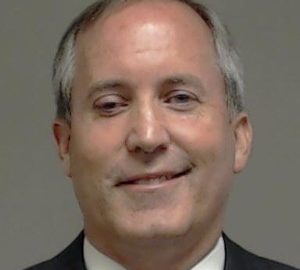In his bid to end Obama-era deportation protections for young immigrants, Texas Attorney General Ken Paxton went 350 miles out of his way to file suit in Brownsville’s federal courthouse. The effort paid off when he got the judge he wanted.
U.S. District Judge Andrew Hanen, nominated by a Republican president, has lambasted the Obama administration’s immigration practices in prior cases and gave Paxton a victory in a similar lawsuit in 2015.
With history in mind, Paxton expressed confidence that Deferred Action for Childhood Arrivals, or DACA, “will meet the same fate” — a Hanen order blocking the immigration program in all 50 states.
“We were successful filing almost the exact same form of action (in 2015) … so we have confidence that ultimately we will get the same result,” Paxton said when he announced his lawsuit May 1.
Immigration advocates quickly criticized the lawsuit, which was joined by Republican attorneys general from six other states, saying it could harm about 700,000 immigrants who were illegally brought to the United States as children, have been productive members of U.S. society and have known no other country.
Critics also accused Paxton of forum shopping, the practice of filing lawsuits in a specific court in hopes of getting a sympathetic judge — in this case, Hanen.
“They picked this judge because they thought that they would get a favorable ruling out of it, and that’s wrong,” said Justin Nelson, an Austin lawyer and Democratic candidate seeking to oust Paxton in the November election for attorney general.
“The whole idea is that we’re picking judges to call things as they see it, fairly and accurately, according to the rule of law. And if you know your judge on the way in and you think that judge is going to give you a nationwide injunction, then I think it’s contrary to our notion of equal justice under the law and that justice is blind,” Nelson said.
Marc Rylander, Paxton’s spokesman, said that proper legal procedures were followed and that Brownsville, located on the U.S.-Mexico border, is the appropriate venue to challenge President Barack Obama’s immigration order establishing the DACA protections.
“Federal law allows these suits to be brought where the activity occurs,” Rylander said.
In addition, he said, Paxton was following the lead of Gov. Greg Abbott, a fellow Republican who filed a similar immigration lawsuit in Brownsville when he was attorney general in 2014.
That 2014 lawsuit prompted Hanen to block an Obama program known as DAPA, or Deferred Action for Parents of Americans, which would have extended deportation protection to about 4 million unauthorized immigrants who were parents of U.S. citizens and legal residents.
“Because DACA is related, we filed in the same court,” Rylander said.
Judge with a history
By filing his lawsuit in Brownsville, Paxton steered it to two federal judges who serve the border city — Hanen, named to the bench by President George W. Bush in 2002, and Rolando Olvera, an Obama selection in 2015.
The lawsuit was randomly assigned to Olvera, but within hours he transferred it to Hanen — common practice when one judge has presided over a similar case in the past.
Hanen, 64, has a reputation as a conservative judge with a libertarian streak who is quick to crack down when he perceives overreach by the federal government, and immigration-related cases have thrust him into national prominence:
• While sentencing a woman caught trying to smuggle a young girl over the border in 2013, Hanen rebuked the Homeland Security Department for delivering the girl to her mother, who was living in Virginia illegally and had paid to have the child brought to the United States.
“DHS should cease telling the citizens of the United States that it is enforcing our border security laws because it is not. Even worse, it is helping those who violate these laws,” Hanen wrote, accusing the Obama administration of abetting the mother’s crime in a “dangerous and unconscionable” manner.
• In February 2015, Hanen blocked the Obama administration’s efforts to create DAPA and expand the number of young immigrants protected under DACA. No laws gave the administration the power to enact the deportation shield, the judge wrote. “In fact the law mandates that these illegally present individuals be removed,” he said.
That ruling was affirmed by the 5th U.S. Circuit Court of Appeals and allowed to stand when the U.S. Supreme Court deadlocked 4-4 on the issue in 2016.
• While the Supreme Court was weighing his DAPA ruling, Hanen ordered several thousand U.S. Justice Department lawyers to take ethics classes after accusing the department’s attorneys of lying to him about actions taken to implement DAPA policies in a “calculated plan of unethical conduct.”
The department argued that the dispute was based on a misunderstanding, and Hanen later halted the order.
• During the DAPA litigation, Hanen ordered the federal government to turn over the names and addresses of about 50,000 immigrants who had received deferred action under the expanded program.
Although the list would not be available to the public, Hanen stirred fears among immigrant advocates when he acknowledged that the information might be given to Texas and the other 25 states that filed suit if they could provide compelling arguments for its release. Later, the judge halted that order.
Hanen’s immigration-related actions gained praise from conservatives — Paxton called his DAPA decision “a victory for the rule of law in America and a crucial first step in reining in President Obama’s lawlessness” — while immigrant advocates have sounded the alarm.
By taking his lawsuit to Brownsville, Frank Sharry of advocacy group America’s Voice argued, Paxton handed the case “to his fellow anti-immigrant crusader Judge Hanen.”
‘Maximum advantage’
For a federal court to accept a lawsuit, the important facts in dispute must have occurred within its geographic district.
When national policies are involved, however, there can be several districts to choose from, and there is a continuing and robust debate over whether forum shopping can be considered an abuse of the legal system or important to the zealous representation of a client.
Paxton has been accused of forum shopping in other lawsuits, particularly his 2016 challenge to the Obama administration’s directive on transgender-friendly bathrooms in public schools. That lawsuit was filed in Fort Worth, where District Judge Reed O’Connor, who was nominated by Bush in 2007, issued a nationwide injunction banning the directive.
On the other hand, Paxton has defended laws that have been challenged in federal courts across the state.
Lawsuits targeting Texas abortion restrictions are routinely filed in Austin federal court, where judges have tossed out several laws in recent years. And a lawsuit to end the statewide election of the state’s highest court judges — arguing that the practice dilutes the strength of Latino voters — was filed in Corpus Christi, where an Obama-appointed judge had blocked the state’s voter ID law for discriminating against minority voters.
“It shouldn’t surprise anyone that lawyers are going to do whatever they can to manipulate their lawsuit to their maximum advantage,” said Stephen Vladeck, a University of Texas law professor who focuses on constitutional law and federal jurisdiction.
Forum shopping can provide some advantages beyond a hoped-for sympathetic hearing before a particular judge. Hanen, for example, has experience in the complicated field of immigration law, is familiar with the background dispute and knows the players involved, Vladeck said.
The practice can also erode confidence in the notion of impartial justice.
“There are folks who have very little doubt about which way Judge Hanen is likely to rule,” Vladeck said. “The concern is that you are picking judges who are outside the mainstream, that you’re … forum shopping basically as a way of getting as unrepresentative a judge as you can get within the federal system.”
Such concerns become magnified, Vladeck said, when the goal is a nationwide injunction barring the government from enforcing a specific policy.
“But it’s important to keep in mind, you can’t forum shop the Supreme Court,” he said. “Forum shopping really is about who is going to get the first bite of the apple, not who is going to get the last bite.”
Whichever way Hanen rules, the losing side will appeal, creating a path to the nine justices on the high court.
And if he blocks DACA, Hanen would almost ensure that the Supreme Court steps in to resolve a ruling that conflicts with three other federal judges who have ordered the Trump administration to continue the program.
Political stakes
Immigration, border security and DACA will be campaign issues as Paxton seeks his second four-year term as attorney general.
Nelson, his Democratic opponent, accused Paxton of playing politics with the lives of DACA recipients by filing an unnecessary lawsuit to appease a “hard-right extremist ideology.”
Seeking out Hanen as the judge only makes the situation worse, he said.
“The attorney general, like any public officer, has a higher duty than just winning a case. They have a duty to the Constitution,” Nelson said. “It’s not an excuse to say I want to win. It’s important to do things the right way, and it’s important as much as possible to take politics out of the law, and my opponent is doing the opposite.”
Paxton insists that the rule of law is on his side because Congress, not the president, has the authority to determine federal immigration law.
Matt Welch, spokesman for Paxton’s re-election campaign, said Nelson is barking up the wrong tree.
“Attorney General Paxton has a duty to defend the Constitution and specifically the principles of separation of powers which the Constitution mandates. No one person, even the president, is above the Constitution,” Welch said. “The DACA lawsuit seeks to return the power back to the legislative branch where it belongs.”
Neither candidate faced opposition in the party primaries.
Article by Chuck Lindell • View on Austin American-Statesman



